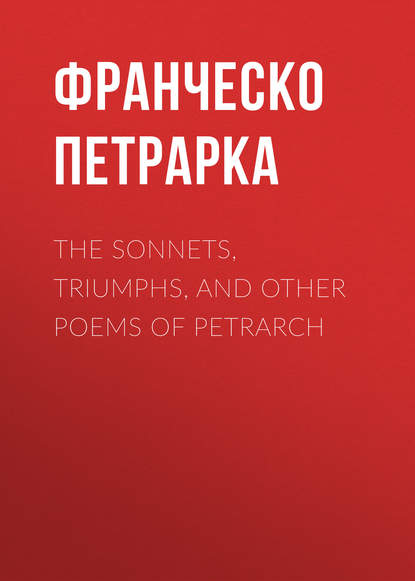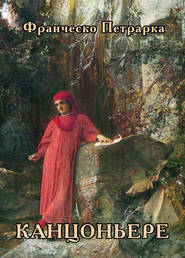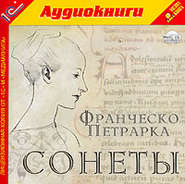По всем вопросам обращайтесь на: info@litportal.ru
(©) 2003-2025.
✖
The Sonnets, Triumphs, and Other Poems of Petrarch
Настройки чтения
Размер шрифта
Высота строк
Поля
With what sad thoughts I know, and she'll confess
And you, if you have sense of love, may guess;
No heir she left me, but my tedious moan;
And though in her my hopes and joys were gone,
She was of lower value than my faith!
But now farewell, and try if this troop hath
Another wonder; for the time is less
Than is the task." I pitied their distress,
Whose short joy ended in so sharp a woe:
My soft heart melted. As they onward go,
"This youth for his part, I perhaps could love,"
She said; "but nothing can my mind remove
From hatred of the nation." He replied,
"Good Sophonisba, you may leave this pride;
Your city hath by us been three times beat,
The last of which, you know, we laid it flat."
"Pray use these words t' another, not to me,"
Said she; "if Africk mournèd, Italy
Needs not rejoice; search your records, and there
See what you gainèd by the Punic war."
He that was friend to both, without reply
A little smiling, vanish'd from mine eye
Amongst the crowd. As one in doubtful way
At every step looks round, and fears to stray
(Care stops his journey), so the varied store
Of lovers stay'd me, to examine more,
And try what kind of fire burnt every breast:
When on my left hand strayèd from the rest
Was one, whose look express'd a ready mind
In seeking what he joy'd, yet shamed to find;
He freely gave away his dearest wife
(A new-found way to save a lover's life);
She, though she joy'd, yet blushèd at the change.
As they recounted their affections strange,
And for their Syria mourn'd; I took the way
Of these three ghosts, who seem'd their course to stay
And take another path: the first I held
And bid him turn; he started, and beheld
Me with a troubled look, hearing my tongue
Was Roman, such a pause he made as sprung
From some deep thought; then spake as if inspired,
For to my wish, he told what I desired
To know: "Seleucus is," said he, "my name,
This is Antiochus my son, whose fame
Hath reach'd your ear; he warrèd much with Rome,
But reason oft by power is overcome.
This woman, once my wife, doth now belong
To him; I gave her, and it was no wrong
In our religion; it stay'd his death,
Threaten'd by Love; Stratonica she hath
To name: so now we may enjoy one state,
And our fast friendship shall outlast all date.
She from her height was willing to descend;
I quit my joy; he rather chose his end
Than our offence; and in his prime had died,
Had not the wise Physician been our guide;
Silence in love o'ercame his vital part;
His love was force, his silence virtuous art.
A father's tender care made me agree
To this strange change." This said, he turn'd from me,
As changing his design, with such a pace,
Ere I could take my leave, he had quit the place
After the ghost was carried from mine eye,
Amazedly I walk'd; nor could untie
My mind from his sad story; till my friend
Admonish'd me, and said, "You must not lend
Attention thus to everything you meet;
You know the number's great, and time is fleet."
More naked prisoners this triumph had
Than Xerxes soldiers in his army led:
And stretchèd further than my sight could reach;
Of several countries, and of differing speech.
One of a thousand were not known to me,
Yet might those few make a large history.
Perseus was one; and well you know the way
How he was catchèd by Andromeda:
She was a lovely brownet, black her hair
And eyes. Narcissus, too, the foolish fair,
Who for his own love did himself destroy;
He had so much, he nothing could enjoy.
And she, who for his loss, deep sorrow's slave.
Changed to a voice, dwells in a hollow cave.
Iphis was there, who hasted his own fate,
He loved another, but himself did hate;
And many more condemn'd like woes to prove,
Whose life was made a curse by hapless love.
Some modern lovers in my mind remain,
But those to reckon here were needless pain:
The two, whose constant loves for ever last,
On whom the winds wait while they build their nest;
For halcyon days poor labouring sailors please.
And in rough winter calm the boisterous seas.
Far off the thoughtful Æsacus, in quest
Of his Hesperia, finds a rocky rest,
Then diveth in the floods, then mounts i' th' air;
And she who stole old Nisus' purple hair
His cruel daughter, I observed to fly:
Swift Atalanta ran for victory,
But three gold apples, and a lovely face,
Slack'd her quick paces, till she lost the race;
And you, if you have sense of love, may guess;
No heir she left me, but my tedious moan;
And though in her my hopes and joys were gone,
She was of lower value than my faith!
But now farewell, and try if this troop hath
Another wonder; for the time is less
Than is the task." I pitied their distress,
Whose short joy ended in so sharp a woe:
My soft heart melted. As they onward go,
"This youth for his part, I perhaps could love,"
She said; "but nothing can my mind remove
From hatred of the nation." He replied,
"Good Sophonisba, you may leave this pride;
Your city hath by us been three times beat,
The last of which, you know, we laid it flat."
"Pray use these words t' another, not to me,"
Said she; "if Africk mournèd, Italy
Needs not rejoice; search your records, and there
See what you gainèd by the Punic war."
He that was friend to both, without reply
A little smiling, vanish'd from mine eye
Amongst the crowd. As one in doubtful way
At every step looks round, and fears to stray
(Care stops his journey), so the varied store
Of lovers stay'd me, to examine more,
And try what kind of fire burnt every breast:
When on my left hand strayèd from the rest
Was one, whose look express'd a ready mind
In seeking what he joy'd, yet shamed to find;
He freely gave away his dearest wife
(A new-found way to save a lover's life);
She, though she joy'd, yet blushèd at the change.
As they recounted their affections strange,
And for their Syria mourn'd; I took the way
Of these three ghosts, who seem'd their course to stay
And take another path: the first I held
And bid him turn; he started, and beheld
Me with a troubled look, hearing my tongue
Was Roman, such a pause he made as sprung
From some deep thought; then spake as if inspired,
For to my wish, he told what I desired
To know: "Seleucus is," said he, "my name,
This is Antiochus my son, whose fame
Hath reach'd your ear; he warrèd much with Rome,
But reason oft by power is overcome.
This woman, once my wife, doth now belong
To him; I gave her, and it was no wrong
In our religion; it stay'd his death,
Threaten'd by Love; Stratonica she hath
To name: so now we may enjoy one state,
And our fast friendship shall outlast all date.
She from her height was willing to descend;
I quit my joy; he rather chose his end
Than our offence; and in his prime had died,
Had not the wise Physician been our guide;
Silence in love o'ercame his vital part;
His love was force, his silence virtuous art.
A father's tender care made me agree
To this strange change." This said, he turn'd from me,
As changing his design, with such a pace,
Ere I could take my leave, he had quit the place
After the ghost was carried from mine eye,
Amazedly I walk'd; nor could untie
My mind from his sad story; till my friend
Admonish'd me, and said, "You must not lend
Attention thus to everything you meet;
You know the number's great, and time is fleet."
More naked prisoners this triumph had
Than Xerxes soldiers in his army led:
And stretchèd further than my sight could reach;
Of several countries, and of differing speech.
One of a thousand were not known to me,
Yet might those few make a large history.
Perseus was one; and well you know the way
How he was catchèd by Andromeda:
She was a lovely brownet, black her hair
And eyes. Narcissus, too, the foolish fair,
Who for his own love did himself destroy;
He had so much, he nothing could enjoy.
And she, who for his loss, deep sorrow's slave.
Changed to a voice, dwells in a hollow cave.
Iphis was there, who hasted his own fate,
He loved another, but himself did hate;
And many more condemn'd like woes to prove,
Whose life was made a curse by hapless love.
Some modern lovers in my mind remain,
But those to reckon here were needless pain:
The two, whose constant loves for ever last,
On whom the winds wait while they build their nest;
For halcyon days poor labouring sailors please.
And in rough winter calm the boisterous seas.
Far off the thoughtful Æsacus, in quest
Of his Hesperia, finds a rocky rest,
Then diveth in the floods, then mounts i' th' air;
And she who stole old Nisus' purple hair
His cruel daughter, I observed to fly:
Swift Atalanta ran for victory,
But three gold apples, and a lovely face,
Slack'd her quick paces, till she lost the race;














